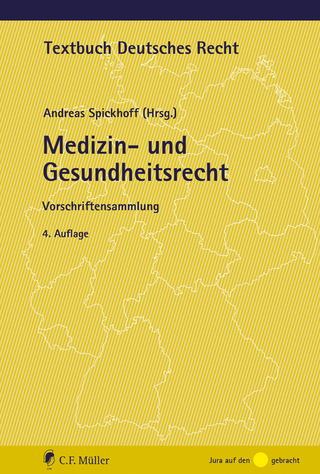
Public Health Law, Ethics, and Policy
Cases and Materials
Seiten
2021
|
2nd Revised edition
West Academic Press (Verlag)
978-1-68467-319-3 (ISBN)
West Academic Press (Verlag)
978-1-68467-319-3 (ISBN)
- Titel z.Zt. nicht lieferbar
- Versandkostenfrei innerhalb Deutschlands
- Auch auf Rechnung
- Verfügbarkeit in der Filiale vor Ort prüfen
- Artikel merken
Offers the most comprehensive and teachable compilation of materials on public health law now available. This updated second edition provides significant new materials on the unprecedented challenges for courts and government policymakers presented by the COVID-19 pandemic.
This pioneering book offers the most comprehensive and teachable compilation of materials on public health law now available. The updated 2nd edition provides significant new materials on the unprecedented challenges for courts and government policymakers presented by the COVID-19 pandemic. Its unique perspective highlights the evolving legal, political and social responses to the current infectious disease outbreak—in the context of earlier court cases and policies dating back to cholera in the 1900s through SARS and Ebola in this century.
The 2nd edition also features the emergence of health equity as a key public health perspective, as increasingly detailed data document the differential impact of upstream social and environmental determinants on the health of the public and on the health of particular populations. Other updates focus on "system-approaches" to complex health problems, such as opioid misuse and obesity, that require data, engagement and coordination across numerous government entities.
One of the challenges of teaching public health law is that it touches many other government sectors and bodies of law. This book solves that problem by organizing and integrating the material to address (1) cross-cutting themes in public health policy, such as government authority and justification to restrict individual liberties or use emergency powers and (2) the primary policy tools used by public health policymakers and practitioners, from behavioral interventions such as immunization and quarantine to environmental regulations. The book aims to explore topics from different points of view, weaving together public health sciences, ethics, law, and public policy.
In perhaps their most exciting innovation, Bonnie, Bernheim and Matthews have constructed an intriguing and diverse menu of teachable units focused on specific policy problems or case studies in public health action. The book weaves together pertinent medical information and public health statistics, court decisions and other legal materials, and ethics commentaries. It uses both judicial opinions and concrete problems in public health policy and practice as the main vehicles for classroom discussion. Examples include leading a community response to COVID-19 that addresses health disparities, differential social and economic need, vaccine allocation and resistance; and preparing public health testimony for a state legislature on immunization requirements or exemptions. Other case studies include substandard housing as a determinant of health, and the upstream effects of climate change on the health of children. Students are also exposed to a variety of cross-cutting regulatory frameworks, including product safety, environmental protection, and data privacy.
This book is richly interdisciplinary. Although designed for students of law, the book can easily be adapted to courses designed for students in public health, public policy and interprofessional settings examining the role of law and public policy in advancing population health and health equity.
This pioneering book offers the most comprehensive and teachable compilation of materials on public health law now available. The updated 2nd edition provides significant new materials on the unprecedented challenges for courts and government policymakers presented by the COVID-19 pandemic. Its unique perspective highlights the evolving legal, political and social responses to the current infectious disease outbreak—in the context of earlier court cases and policies dating back to cholera in the 1900s through SARS and Ebola in this century.
The 2nd edition also features the emergence of health equity as a key public health perspective, as increasingly detailed data document the differential impact of upstream social and environmental determinants on the health of the public and on the health of particular populations. Other updates focus on "system-approaches" to complex health problems, such as opioid misuse and obesity, that require data, engagement and coordination across numerous government entities.
One of the challenges of teaching public health law is that it touches many other government sectors and bodies of law. This book solves that problem by organizing and integrating the material to address (1) cross-cutting themes in public health policy, such as government authority and justification to restrict individual liberties or use emergency powers and (2) the primary policy tools used by public health policymakers and practitioners, from behavioral interventions such as immunization and quarantine to environmental regulations. The book aims to explore topics from different points of view, weaving together public health sciences, ethics, law, and public policy.
In perhaps their most exciting innovation, Bonnie, Bernheim and Matthews have constructed an intriguing and diverse menu of teachable units focused on specific policy problems or case studies in public health action. The book weaves together pertinent medical information and public health statistics, court decisions and other legal materials, and ethics commentaries. It uses both judicial opinions and concrete problems in public health policy and practice as the main vehicles for classroom discussion. Examples include leading a community response to COVID-19 that addresses health disparities, differential social and economic need, vaccine allocation and resistance; and preparing public health testimony for a state legislature on immunization requirements or exemptions. Other case studies include substandard housing as a determinant of health, and the upstream effects of climate change on the health of children. Students are also exposed to a variety of cross-cutting regulatory frameworks, including product safety, environmental protection, and data privacy.
This book is richly interdisciplinary. Although designed for students of law, the book can easily be adapted to courses designed for students in public health, public policy and interprofessional settings examining the role of law and public policy in advancing population health and health equity.
| Erscheinungsdatum | 10.02.2022 |
|---|---|
| Reihe/Serie | University Casebook Series |
| Verlagsort | Minnesota |
| Sprache | englisch |
| Maße | 191 x 254 mm |
| Themenwelt | Recht / Steuern ► EU / Internationales Recht |
| Recht / Steuern ► Privatrecht / Bürgerliches Recht ► Medizinrecht | |
| ISBN-10 | 1-68467-319-4 / 1684673194 |
| ISBN-13 | 978-1-68467-319-3 / 9781684673193 |
| Zustand | Neuware |
| Haben Sie eine Frage zum Produkt? |
Mehr entdecken
aus dem Bereich
aus dem Bereich
Vorschriftensammlung
Buch | Softcover (2024)
C.F. Müller (Verlag)
55,00 €


